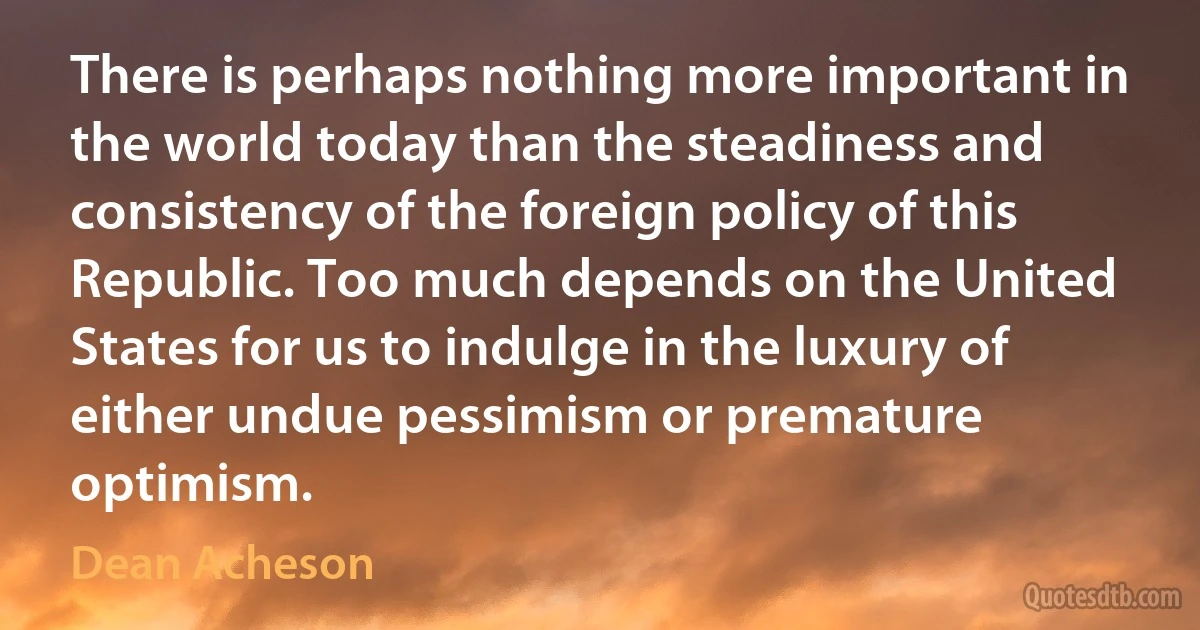Consistency Quotes - page 3
P. Bernays has pointed out on several occasions that, since the consistency of a system cannot be proved using means of proof weaker than those of the system itself, it is necessary to go beyond the framework of what is, in Hilbert's sense, finitary mathematics if one wants to prove the consistency of classical mathematics, or even that of classical number theory. Consequently, since finitary mathematics is defined as the mathematics in which evidence rests on what is intuitive, certain abstract notions are required for the proof of the consistency of number theory.... In the absence of a precise notion of what it means to be evident, either in the intuitive or in the abstract realm, we have no strict proof of Bernays' assertion; practically speaking, however, there can be no doubt that it is correct...

Paul Bernays
Recipe idea: take on fire extinguisher and pour out all the contents. Mix down a nice bright emulsion paint to the consistency of full fat milk, stirring constantly to remove any lumps. Pour into the extinguisher, screw on cap tightly and write on things up to 50 feet high. Re-use by swapping over the CO2 charged canister (costs about one pound). The perfect accompaniment to a night out drinking heavily with friends.

Banksy
Demiurgus [said my father] was enamoured of refined, perfect, and sophisticated materials. We give precedence to junk. We are simply rapt by it, entranced by the cheapness, the paltriness, the tawdriness of the material. Do you understand,” my father asked, "the profound meaning of that weakness, that passion for gaudy tissue-paper, papier-mâ ché, coloured lacquer, straw, and sawdust? It is,” he said with a pained smile, "our love for matter as such, for its downiness and porousness, its unique, mystical consistency. Demiurgus, that renowned master and artist, hides it away, causes it to vanish behind life's make-believe. We, to the contrary, love its abrasiveness, its unruliness, its rag doll ungainliness. Behind each gesture, each movement, we like to see its exertion, its torpor, its sweet ursinality.

Bruno Schulz
The habits of study acquired at Universities are of the highest importance in after-life. At the season when you are in young years the whole mind is, as it were, fluid, and is capable of forming itself into any shape that the owner of the mind pleases to order it to form itself into. The mind is in a fluid state, but it hardens up gradually to the consistency of rock or iron, and you cannot alter the habits of an old man, but as he has begun he will proceed and go on to the last.

Thomas Carlyle
In the heavens, then, there is no chance, irregularity, deviation, or falsity, but on the other hand the utmost order, reality, method, and consistency. The things which are without these qualities, phantasmal, unreal, and erratic, move in and around the earth below the moon, which is the lowest of all the heavenly bodies. Any one, therefore, who thinks that there is no intelligence in the marvellous order of the stars and in their extraordinary regularity, from which the preservation and the entire well-being of all things proceed, ought to be considered destitute of intelligence himself.

Cicero
Nasruddin, four years ago you were here, and I asked that time also what is your age, and you told me forty years. Now this is absolutely inconsistent – how can you still be forty?"
Nasruddin said, "I am a man of consistency. Once forty, I remain forty always. When I have answered once, I have answered forever! You cannot lead me astray. I am forty, and whenever you ask you will get the same answer.

Nasreddin
Great thinkers build their edifices with subtle consistency. We do our intellectual forebears an enormous disservice when we dismember their visions and scan their systems in order to extract a few disembodied "gems”-thoughts or claims still accepted as true. These disarticulated pieces then become the entire legacy of our ancestors, and we lose the beauty and coherence of older systems that might enlighten us by their unfamiliarity-and their consequent challenge-in our fallible (and complacent) modern world.

Stephen Jay Gould
I've done my best, but the boy is unteachable. He doubts everything, and contests each point of theology as if it were required to meet the same tests of logic and consistency that prevail in the world of science.”
"In other words, he expects your doctrines to make sense.”
"He is unwilling to accept the idea that some things remain mysteries, comprehensible only to the mind of God. Ambiguity makes him saucy, and paradox causes open rebellion.

Orson Scott Card
Intelligence is always connective. The biosphere works this way, through continuous contacts, catalysts, neurons which touch and activate other neurons. Today, this all has not only biological and chemical consistency, but a technological and teleinformatics one: it is not just a metaphor, or a "virtual" reality, but a real entity, a kind of emanation of the biosphere.

Caterina Davinio
In 1946 what I call my 'Little Image' began breaking through this [former] gray matter of mine. I felt fantastic relief that something was beginning to happen after all this time when there was nothing, nothing, nothing... The canvas is down on a floor or table and I am working out of a tiny can. In other words, I have to hold the paint so I can move it. But I wouldn't have been using Duco [industrial paint, like Willem de Kooning did]. My paint would always have been oil and I could get the consistency of a thick pouring quality in it by squeezing it into a can and cutting it with turp [turpetine] – the way I use paint today... The only thing I can say with absolute assurance is that my 'Little Image' work starts about 1946 and ends in 1949.

Lee Krasner



